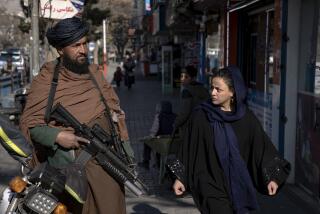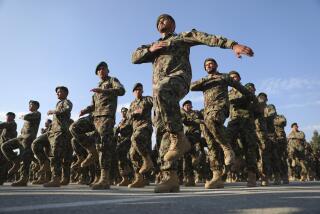U.N. Official Says Investigation Into Afghan Grave Site Must Wait
- Share via
KABUL, Afghanistan — The chief U.N. official in Afghanistan said Tuesday that there is no chance soon of a thorough, impartial investigation into the alleged murder last fall of Taliban soldiers, which might implicate troops loyal to one of the country’s most powerful warlords, Gen. Abdul Rashid Dostum.
Afghanistan must become far more orderly and stable before the alleged perpetrators can be pursued without endangering the lives of witnesses who remain in the area, said U.N. special envoy Lakhdar Brahimi.
“Politics is the art of the possible,” he said.
In other areas, however, Brahimi praised the progress of the Afghan government led by President Hamid Karzai as it seeks to consolidate peace and establish order in a devastated country that endured more than two decades of war.
Despite a spate of recent minor explosions here in the edgy capital, including one outside a United Nations residence Sunday, government and international authorities believe Kabul is becoming safe enough to soon lift its midnight-to-4 a.m. curfew, Brahimi said. And training of new police and army forces, if it continues apace, should allow the country to stand on its own within two years, he said.
Brahimi’s comments came as Afghan officials announced that they were ready to free hundreds of captured Pakistanis who fought on the side of the deposed Taliban regime.
In another gesture of warming relations between Afghanistan and Pakistan, the countries have promised to cooperate in the pursuit of Al Qaeda fighters who are believed to be hiding in mountainous areas along their shared border.
Speaking at the end of a two-day visit to Islamabad, the Pakistani capital, Afghan Foreign Minister Abdullah said he and Interior Minister Moinuddin Haider of Pakistan agreed to establish mechanisms for cooperation between their security organizations, particularly to target terrorists and drug smugglers.
Abdullah said the release of the prisoners would begin within days. Pakistan estimates that more than 900 of its citizens remain in prison in Afghanistan.
In discussing alleged war crimes, Brahimi--one of the U.N.’s most experienced trouble-shooters--said difficult compromises often have to be made and justice sometimes postponed in the interests of achieving peace and stability.
He suggested that may be true for the investigation into mass graves recently discovered in northern Afghanistan, which are believed to contain the remains of slain Taliban prisoners taken into custody in October when Dostum’s forces seized the cities of Kunduz and Mazar-i-Sharif.
Taliban survivors have alleged that they were forced into steel shipping containers, without water or ventilation, that were used as makeshift prisons. They say scores and perhaps hundreds of fighters died before the containers were opened several days later.
The U.S.-based group Physicians for Human Rights examined a grave site in May and said it appeared that hundreds of victims had been dumped there. A recent Newsweek article cited a confidential U.N. report that quoted a witness as saying 960 people were killed.
Dostum, an ethnic Uzbek general who recently served as deputy defense minister, remains the chief strongman in that part of northern Afghanistan.
Brahimi said that trying to conduct a thorough investigation of such alleged atrocities in those circumstances could threaten the safety of anyone who took part or came forth with information.
“There is no judicial system that you can really expect to face up to a situation like this,” he said.
“There is no police, proper police, to protect the people. So I think choices have to be made,” he said.
Later, he clarified his thinking:
“In a given moment in time, you have got to know how to take difficult decisions.... It is not a question of condoning or forgetting about crimes--serious crimes. But it is about moving [forward] the peace process in the interests of the people of Afghanistan.”
Nevertheless, Brahimi expressed optimism about the country’s future.
“The people of Afghanistan remain consistently conscious of the desperate need for peace for their country,” he said. “There is certainly every reason to be hopeful that the consolidation of that peace will happen.”
More to Read
Sign up for Essential California
The most important California stories and recommendations in your inbox every morning.
You may occasionally receive promotional content from the Los Angeles Times.













